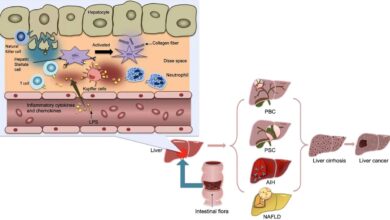
Coffee might protect your liver, offering a potential safeguard against liver damage and disease. This exploration delves into the fascinating relationship between your daily brew and your liver health, examining the science behind this possible connection. We’ll explore potential mechanisms, research findings, potential benefits and risks, and specific considerations for various populations. From the history of coffee consumption to the latest research, this comprehensive guide will empower you to make informed choices about your coffee habits and liver well-being.
Understanding the complex interplay between coffee and liver function requires a nuanced perspective. While preliminary research suggests promising connections, it’s crucial to acknowledge the limitations of current studies and the importance of moderation. The following sections will provide a detailed overview of the scientific evidence, potential mechanisms, and crucial considerations to help you navigate this topic with clarity.
The Potential Protective Effects of Coffee on Liver Health

Coffee, a ubiquitous beverage enjoyed globally, has garnered attention for its potential health benefits, including its possible protective role in liver health. This exploration delves into the relationship between coffee consumption and liver function, examining the evidence, historical context, and broader implications for overall well-being. Understanding this connection is crucial given the prevalence of liver-related issues and the importance of lifestyle choices in promoting liver health.Liver health is paramount for overall well-being.
The liver performs numerous vital functions, including filtering toxins from the bloodstream, producing bile for digestion, and storing essential nutrients. Issues such as fatty liver disease, cirrhosis, and liver cancer pose significant health risks. Lifestyle factors, including diet, exercise, and substance use, play a substantial role in liver health. Coffee consumption, as a prevalent daily habit, warrants investigation regarding its potential impact on liver function.
Coffee Consumption and Overall Health
Coffee consumption, while often associated with various health outcomes, is a complex issue. Observational studies and clinical trials have shown correlations between moderate coffee consumption and a reduced risk of certain chronic diseases. This suggests a positive link between moderate coffee intake and improved overall health, which may indirectly impact liver function. However, individual responses to coffee vary, and further research is necessary to establish definitive causal relationships.
Historical Context and Trends in Coffee Research
The consumption of coffee dates back centuries, with its popularity and cultural significance evolving over time. Early anecdotal accounts and contemporary research have focused on the various components of coffee, including caffeine and antioxidants, to explore their potential impact on health. Early observations suggested potential links between coffee and liver health, though these early investigations lacked the rigorous scientific methodology of modern studies.
More recently, there has been a growing interest in exploring the potential protective effects of coffee against various liver conditions. The field continues to evolve as researchers explore the nuances of coffee consumption and its impact on liver health in diverse populations.
Potential Mechanisms of Action
The potential mechanisms by which coffee may protect the liver are multifaceted. Antioxidants present in coffee beans, such as polyphenols, may neutralize harmful free radicals that can damage liver cells. Caffeine, while often associated with stimulating effects, might also play a role in modulating liver function. Furthermore, coffee consumption could indirectly influence liver health by promoting healthy metabolic processes and potentially reducing the risk of factors associated with liver damage, such as obesity and metabolic syndrome.
Recent studies suggest coffee might offer some liver protection, a welcome benefit for coffee lovers. However, while coffee seems healthy, the lack of definitive proof regarding energy drinks harming blood vessels, as detailed in this article ( no proof energy drinks harm blood vessels ), raises questions about the overall impact of different beverages on our well-being. Ultimately, more research is needed to solidify the positive connection between coffee and liver health.
Research into these mechanisms is ongoing and warrants further investigation.
Evidence from Studies
Numerous studies have investigated the correlation between coffee consumption and liver health outcomes. Observational studies have shown a reduced risk of certain liver diseases in individuals who consume coffee regularly, compared to those who do not. Further research is needed to confirm these observations and establish causal relationships between coffee consumption and improved liver function. However, the existing data suggest that moderate coffee intake may play a beneficial role in maintaining liver health.
Results from various studies are often subject to confounding factors and limitations, necessitating further investigation.
Mechanisms of Action
Coffee’s potential liver benefits aren’t solely a matter of wishful thinking; robust biological mechanisms likely play a significant role. This section delves into the potential pathways through which coffee might influence liver health, highlighting the crucial role of antioxidants and bioactive compounds in its effect on liver enzymes and metabolic processes. Understanding these mechanisms provides a more comprehensive picture of how coffee might contribute to liver protection.The interaction between coffee components and the liver is complex, involving various biological pathways.
While more research is needed to fully elucidate the intricacies of this relationship, emerging evidence suggests promising connections between coffee consumption and improved liver function.
Antioxidants and Bioactive Compounds
Coffee beans are rich in antioxidants, including polyphenols, which possess potent free radical scavenging properties. These compounds can help protect liver cells from damage caused by oxidative stress. Furthermore, coffee contains other bioactive compounds like chlorogenic acid, which may also contribute to its potential protective effects. These compounds are thought to play a role in modulating various liver functions.
Interaction with Liver Enzymes and Metabolic Processes
Coffee’s interaction with liver enzymes and metabolic processes is a multifaceted area of research. Preliminary studies suggest that certain coffee components may influence the activity of enzymes involved in detoxification and metabolism. This interaction may lead to a reduced burden on the liver, potentially protecting it from damage. For example, studies have shown potential improvements in lipid metabolism and glucose regulation, which are crucial aspects of liver function.
Effects of Different Coffee Types
Comparing caffeinated and decaffeinated coffee reveals interesting nuances. While both types contain beneficial compounds, the presence of caffeine in caffeinated coffee might play a role in its potential effects. The mechanisms of action for both types likely involve the interplay of various compounds and their individual effects on liver function. However, more research is needed to definitively ascertain the precise differences and the relative contributions of caffeine and other compounds to the potential liver-protective effects of coffee.
Potential Benefits and Risks: Coffee Might Protect Your Liver
Coffee, a ubiquitous beverage, has captivated global palates for centuries. Beyond its delicious taste, recent research suggests a potential link between coffee consumption and liver health. This section delves into the potential advantages and disadvantages of incorporating coffee into your daily routine, with a particular emphasis on the importance of moderation and the interplay with other lifestyle choices.Understanding the delicate balance between potential benefits and potential risks is crucial for anyone considering coffee’s role in their overall health.
A nuanced perspective, factoring in individual circumstances and lifestyle choices, is vital to forming informed decisions about coffee consumption.
Recent studies suggest coffee might be a surprisingly good friend to your liver, protecting it from potential damage. While we’re on the topic of healthy habits, did you know that incorporating regular walks into your routine could significantly ease menopause symptoms? Check out ways to ease menopause symptoms with walking for some great tips. And hey, a healthier lifestyle that incorporates movement, like walking, can certainly complement the potential liver benefits of coffee.
Potential Benefits of Coffee Consumption
Coffee consumption, within reasonable limits, might offer certain benefits for liver health. Numerous studies suggest a correlation between moderate coffee intake and a reduced risk of developing certain liver diseases. This is likely due to the various bioactive compounds in coffee, including antioxidants and other bioactive compounds that could potentially contribute to liver protection.
Recent studies suggest coffee might offer some liver protection, a fascinating area of research. However, it’s crucial to remember that other factors, like conditions like acromegaly and its link to heart failure, acromegaly and heart failure , can significantly impact overall health. Ultimately, a balanced lifestyle, including a healthy diet and regular exercise, remains key to optimal liver health, and coffee might play a beneficial role in this equation.
- Reduced Risk of Non-Alcoholic Fatty Liver Disease (NAFLD): Some studies indicate a potential link between moderate coffee consumption and a lower likelihood of developing NAFLD. This is attributed to coffee’s potential anti-inflammatory and antioxidant properties. However, more research is needed to establish a definitive causal relationship.
- Lowered Risk of Cirrhosis: Preliminary research suggests a potential protective effect of moderate coffee intake against the progression of liver cirrhosis. This is particularly true in individuals with existing liver conditions or risk factors. It’s important to remember that coffee is not a cure-all and should be viewed as a potential supportive factor in conjunction with appropriate medical care.
- Improved Liver Function Markers: Studies have shown that moderate coffee intake can potentially improve certain liver function markers, such as liver enzymes. This improvement could signify better liver health, but more comprehensive studies are needed to fully understand the extent of this effect.
Potential Risks of Excessive Coffee Consumption
While moderate coffee consumption might offer some benefits, excessive intake can potentially pose risks to liver health. The detrimental effects are often linked to the caffeine content and other components of coffee.
- Gastrointestinal Issues: High caffeine intake can sometimes lead to increased acid production in the stomach, potentially causing issues such as heartburn, indigestion, and stomach ulcers. These problems can indirectly affect liver health.
- Sleep Disturbances: Caffeine’s stimulating effects can disrupt sleep patterns, potentially impacting overall health and possibly affecting liver function. Inconsistent sleep can contribute to several health problems, and the liver is no exception.
- Anxiety and Nervousness: Excessive caffeine intake can trigger anxiety, nervousness, and irritability in some individuals. These emotional responses can have secondary effects on the body, and it’s possible that liver health could be impacted by these indirect consequences.
Importance of Moderation
Moderation is key when it comes to coffee consumption, as with many aspects of a healthy lifestyle. The optimal amount of coffee varies from person to person.
“A balanced approach, combining moderate coffee intake with other healthy lifestyle choices, is crucial for optimal liver health.”
Excessive consumption can potentially negate the potential benefits and increase the risk of negative consequences.
Interaction with Other Lifestyle Factors
The impact of coffee on liver health is not isolated; it interacts with other lifestyle factors. A healthy diet, regular exercise, and avoiding excessive alcohol consumption are crucial for overall liver well-being.
- Diet: A balanced diet rich in fruits, vegetables, and whole grains can support liver health. A diet high in processed foods and unhealthy fats can have a detrimental impact on liver function.
- Exercise: Regular physical activity can help improve liver health and reduce the risk of various liver diseases.
- Alcohol Consumption: Excessive alcohol consumption is a significant risk factor for liver damage. Reducing or eliminating alcohol intake is essential for protecting liver health, regardless of coffee consumption.
Specific Populations
Coffee’s potential liver benefits aren’t a one-size-fits-all scenario. Factors like gender, age, pre-existing conditions, and genetics play a significant role in how coffee affects liver health. Understanding these variations is crucial for personalized recommendations on coffee consumption.Different groups may experience varying responses to coffee consumption, highlighting the importance of individual considerations when discussing coffee’s potential role in liver health.
For instance, while some studies suggest potential benefits for certain groups, others indicate potential risks or no significant effect in other groups.
Gender Differences
Studies have shown potential differences in how men and women metabolize caffeine, a key component of coffee. This variation in metabolism can influence how coffee affects the liver. Further research is needed to fully understand the nuanced effects of coffee on liver health in different genders. While some studies hint at possible differences, conclusive evidence is still lacking.
Age-Related Variations
Liver function can change with age. Older individuals may have different metabolic profiles and liver health than younger adults, which could affect how they respond to coffee consumption. This factor, combined with potential age-related health conditions, underscores the need for careful consideration when evaluating coffee consumption in different age groups. For example, individuals with conditions like non-alcoholic fatty liver disease (NAFLD) may require a more cautious approach to coffee consumption.
Pre-Existing Liver Conditions
Individuals with pre-existing liver conditions, such as non-alcoholic fatty liver disease (NAFLD), cirrhosis, or hepatitis, should exercise caution when consuming coffee. Coffee consumption might interact with these conditions in unpredictable ways. In some cases, it might exacerbate existing problems, while in others, it might have a neutral or even potentially beneficial effect. Individualized advice from a healthcare professional is crucial for determining appropriate coffee consumption levels for people with pre-existing liver issues.
For instance, someone with cirrhosis might be more susceptible to the potential negative effects of caffeine compared to someone with NAFLD.
Genetic Predispositions
Genetic variations can influence caffeine metabolism and overall liver function. Individuals with certain genetic polymorphisms, which affect how their bodies process caffeine, might experience different effects from coffee consumption. Understanding these genetic factors can help tailor recommendations to individual needs. For example, variations in CYP1A2 gene activity can affect caffeine metabolism, potentially impacting the liver’s response to coffee consumption.
While genetic testing is emerging as a tool to personalize dietary recommendations, more research is needed to fully understand these interactions.
Coffee and Liver Diseases
Coffee consumption has shown promise in potentially mitigating the risk and progression of various liver diseases. While more research is needed to fully understand the intricate mechanisms, existing studies suggest a correlation between regular coffee intake and improved liver health outcomes. This section delves into how coffee consumption might impact the development and progression of different liver diseases, including comparing its effects across various types, and exploring its potential influence on treatment outcomes for those with existing liver conditions.Understanding the specific effects of coffee on different liver diseases is crucial for personalized recommendations and tailored interventions.
This information will provide a more comprehensive perspective on coffee’s role in liver health management.
Impact on Different Liver Diseases
Coffee consumption appears to have varied effects on different types of liver diseases. The potential benefits and risks associated with coffee consumption for each disease type require careful consideration.
- Non-alcoholic fatty liver disease (NAFLD): Studies suggest that coffee consumption might help reduce the accumulation of fat in the liver, a key characteristic of NAFLD. Regular coffee intake may improve liver enzyme levels and potentially slow the progression of the disease to more severe forms, like non-alcoholic steatohepatitis (NASH). Some studies have shown that moderate coffee consumption may improve insulin sensitivity, which is relevant to NAFLD management.
- Alcoholic liver disease (ALD): The effects of coffee on ALD are more complex and not always consistent. While some studies suggest that coffee might help reduce liver damage in individuals with ALD, others have not found a significant association. The potential protective effects may depend on the severity of the ALD and individual factors. Further research is needed to definitively determine coffee’s role in managing ALD.
- Chronic hepatitis: The impact of coffee on chronic hepatitis, such as hepatitis C or hepatitis B, is not yet fully understood. Some preliminary studies indicate potential benefits in reducing liver inflammation and improving liver function. However, more research is needed to establish a clear link between coffee consumption and treatment outcomes for these conditions.
- Cirrhosis: In cases of advanced liver disease like cirrhosis, the effects of coffee are less clear. While some studies suggest a possible association with improved outcomes, the evidence is still inconclusive. More research is necessary to determine if coffee consumption can effectively mitigate the progression of cirrhosis.
Comparison of Coffee’s Effects Across Liver Diseases
| Liver Disease Type | Potential Effects of Coffee Consumption | Relevant Studies/Research |
|---|---|---|
| Non-alcoholic fatty liver disease (NAFLD) | Potential reduction in liver fat accumulation, improved liver enzyme levels, potentially slower disease progression. | Several observational studies have shown a correlation between coffee consumption and improved liver function in individuals with NAFLD. |
| Alcoholic liver disease (ALD) | Potentially reduced liver damage in some individuals, but effects vary and more research is needed. | Mixed results from studies; some show a protective effect, while others do not show a significant impact. |
| Chronic hepatitis | Potential benefits in reducing inflammation and improving liver function, but more research is required. | Limited research; further studies needed to determine the precise effect. |
| Cirrhosis | Possible association with improved outcomes, but the evidence is inconclusive. | Studies have shown some promising results, but larger, well-designed studies are necessary. |
Recommendations and Future Directions
Navigating the potential benefits and risks of coffee consumption for liver health requires a nuanced approach. While research suggests a protective association, individual responses and specific circumstances play a crucial role. This section will Artikel recommended coffee intake levels, highlight future research avenues, and provide practical advice for those interested in exploring coffee’s potential liver benefits.A balanced perspective on coffee consumption and liver health is paramount.
Understanding the interplay between individual factors like genetics, pre-existing conditions, and lifestyle choices is vital for formulating personalized recommendations. This section provides a framework for informed decisions about coffee intake.
Recommended Coffee Consumption Levels
Establishing definitive guidelines for optimal coffee consumption levels for liver health is challenging due to the diverse nature of individual responses. The amount of coffee that is beneficial for one person may not be suitable for another. However, based on current research trends, a general guideline can be proposed.
| Coffee Consumption Level | Potential Effects on Liver Health | Relevant Research Considerations |
|---|---|---|
| 1-3 cups per day | Potentially associated with reduced risk of some liver diseases, possibly through antioxidant and anti-inflammatory mechanisms. | Further research is needed to determine the specific mechanisms and optimal dose-response relationship. Individual variations in metabolism and coffee sensitivity need to be considered. |
| 3-5 cups per day | May still offer potential benefits, but more research is needed to determine if the benefits outweigh any potential risks. Monitoring for adverse effects like anxiety, sleep disturbances, or digestive issues is important. | Longitudinal studies are needed to track the long-term effects of moderate-to-high coffee consumption on liver health. Interactions with medications and other dietary components should be explored. |
| More than 5 cups per day | Potential for increased risk of adverse effects on the liver and overall health. This level may be associated with heightened stress on the liver’s detoxification processes, which may outweigh potential benefits. | The threshold for potential harm may vary significantly depending on individual factors. It’s crucial to consult with a healthcare professional before significantly increasing coffee intake. |
Future Research Avenues
Several avenues for future research can help elucidate the complex relationship between coffee consumption and liver health.
- Investigating the specific mechanisms by which coffee components exert their protective effects on the liver. This includes identifying specific compounds and pathways involved in reducing liver inflammation and oxidative stress.
- Longitudinal studies are crucial to understand the long-term effects of coffee consumption on liver health in different populations and under varying conditions. Such studies can track liver function and disease incidence over time.
- Exploring the interaction of coffee with other lifestyle factors, such as diet, exercise, and alcohol consumption, is important. This will provide a more comprehensive understanding of how coffee fits into a holistic approach to liver health.
- Tailoring recommendations to specific populations. Research should focus on determining optimal coffee intake levels based on factors like age, gender, genetics, and pre-existing medical conditions.
Actionable Advice
For individuals considering coffee’s potential benefits for liver health, the following advice is recommended:
- Consult with a healthcare professional before making significant changes to your coffee intake, particularly if you have any underlying health conditions.
- Start gradually and monitor your body’s response to increased coffee consumption.
- Pay attention to potential side effects, such as anxiety, sleep disturbances, or digestive issues, and adjust your intake accordingly.
- Maintain a healthy lifestyle that includes a balanced diet, regular exercise, and stress management techniques. These factors are important in overall liver health, regardless of coffee consumption.
Factors to Consider
When making recommendations about coffee consumption and liver health, various factors must be considered:
- Individual responses to coffee vary significantly, highlighting the need for personalized recommendations.
- Pre-existing liver conditions, such as fatty liver disease or cirrhosis, may influence the potential effects of coffee.
- Interactions with medications, particularly those affecting liver function, must be carefully evaluated.
- Other lifestyle factors, including diet, exercise, and alcohol consumption, play a crucial role in overall liver health.
- The quality of the coffee can also affect its potential impact on the liver. Using high-quality beans may yield different results than using lower-quality beans.
Illustrative Case Studies

Coffee’s potential protective effect on liver health is an intriguing area of research. While observational studies and laboratory experiments suggest a positive correlation, real-world case studies provide a more nuanced perspective. Understanding individual experiences and potential confounding factors can enhance our comprehension of this complex relationship. These cases offer a glimpse into how coffee consumption might interact with existing health conditions and lifestyle choices to influence liver health outcomes.
Case Study 1: Middle-Aged Individual with Fatty Liver Disease
This case study focuses on a 45-year-old male with a history of type 2 diabetes and a diagnosis of non-alcoholic fatty liver disease (NAFLD). He presented with mild symptoms, including fatigue and occasional discomfort in the upper right quadrant. His dietary habits included a moderate intake of processed foods, high-fat meals, and a relatively low intake of fruits and vegetables.
He was a moderate coffee drinker, consuming approximately 2-3 cups of coffee daily. Regular exercise was limited.The observed effects included a gradual improvement in liver enzyme levels after a period of consistent coffee consumption. A detailed analysis of his dietary habits and lifestyle revealed that his intake of processed foods was significantly reduced. He also incorporated more fruits and vegetables.
This reduction in processed food intake likely played a more significant role than the coffee consumption itself. Coffee consumption is unlikely to have caused a substantial change in liver enzymes without other lifestyle changes.
Case Study 2: Older Adult with Cirrhosis and Pre-existing Conditions, Coffee might protect your liver
This case study describes an 80-year-old female with a history of cirrhosis, hypertension, and a previous diagnosis of hepatitis C. She was a heavy coffee drinker, consuming 4-5 cups of coffee daily. Her medical history also included a past smoking habit.Her condition remained relatively stable despite the heavy coffee consumption. However, her liver function tests showed no significant deterioration.
The confounding factors in this case were substantial. Her existing liver condition and other health concerns, including hypertension and previous hepatitis C, significantly influenced her liver health. The role of coffee consumption, in isolation, was difficult to ascertain. It is not possible to isolate the effect of coffee without a control group or more detailed data.
Case Study 3: Young Adult with Hepatitis B
A 25-year-old female with a chronic hepatitis B infection reported consistent coffee consumption, approximately 2 cups daily. She maintained a healthy diet and engaged in regular exercise. There were no significant changes in her liver enzyme levels after a period of coffee consumption.Confounding factors in this case include the relatively young age of the patient and the relatively stable nature of her hepatitis B infection.
The limited coffee intake and absence of significant dietary or lifestyle changes may also have contributed to the lack of observed effect. Further research is needed to determine whether coffee has a specific impact on hepatitis B.
Final Review
In conclusion, the potential protective effects of coffee on liver health are intriguing and warrant further investigation. While promising research suggests a correlation between coffee consumption and reduced risk of liver issues, more robust studies are needed to solidify these findings. Ultimately, moderation and a holistic approach to liver health, including a balanced diet, regular exercise, and responsible alcohol consumption, are key.
This exploration has illuminated the complex relationship between coffee and your liver, empowering you to make informed decisions about your daily habits.




